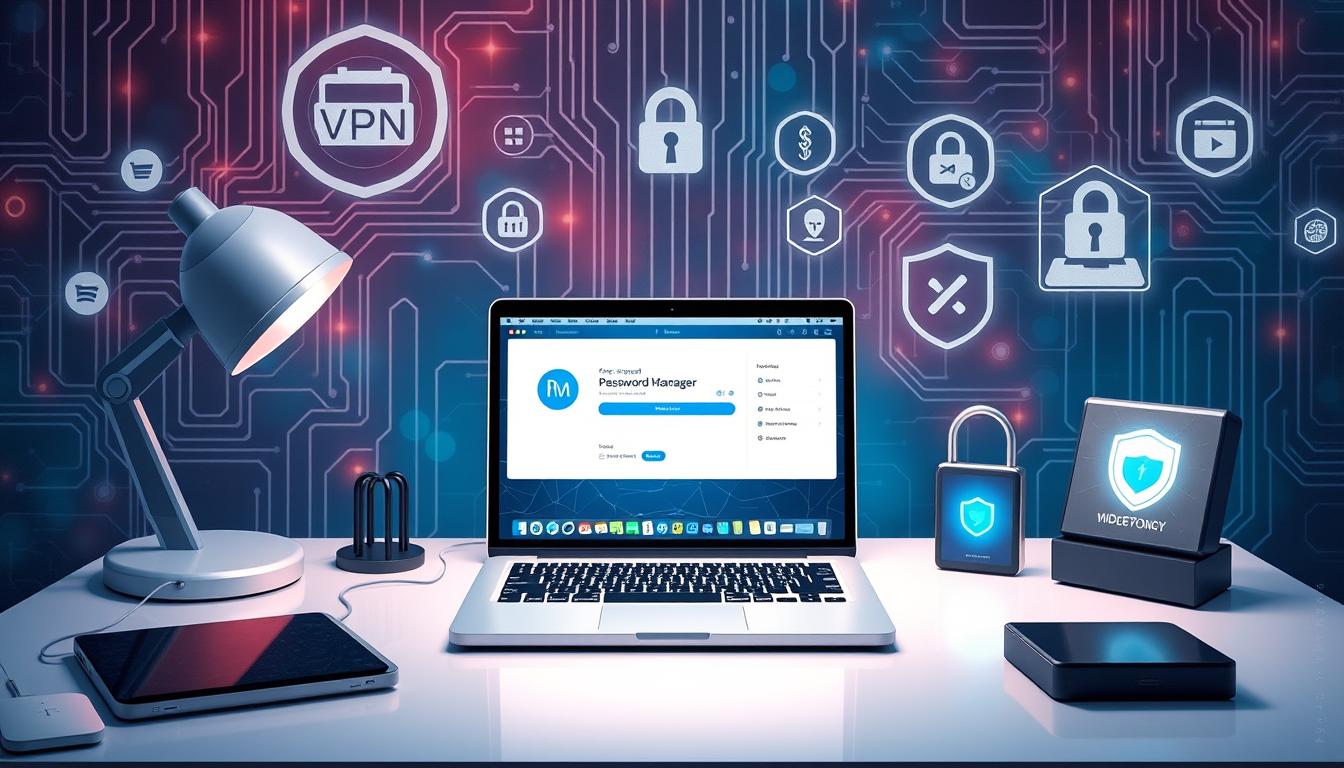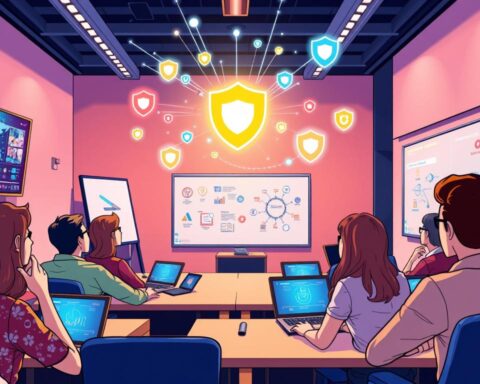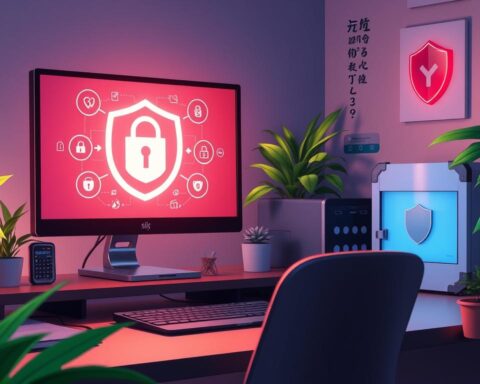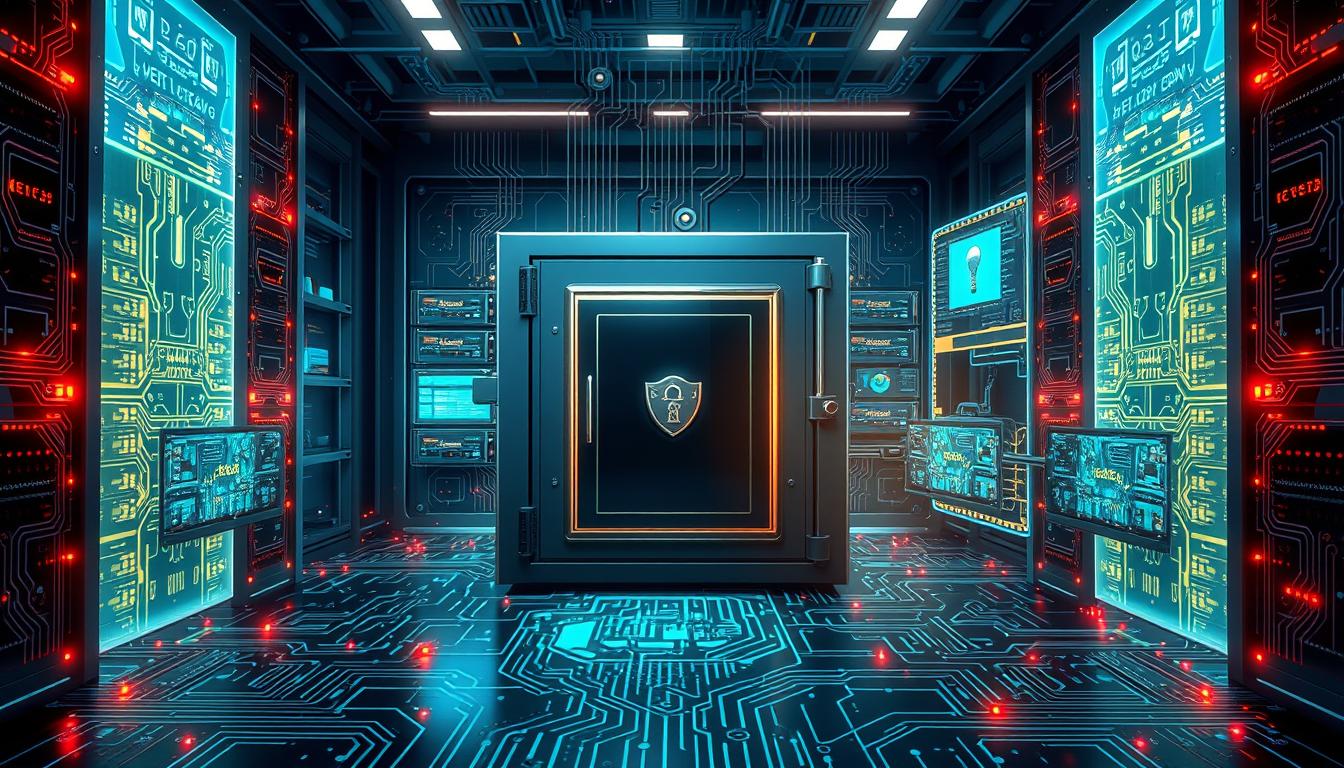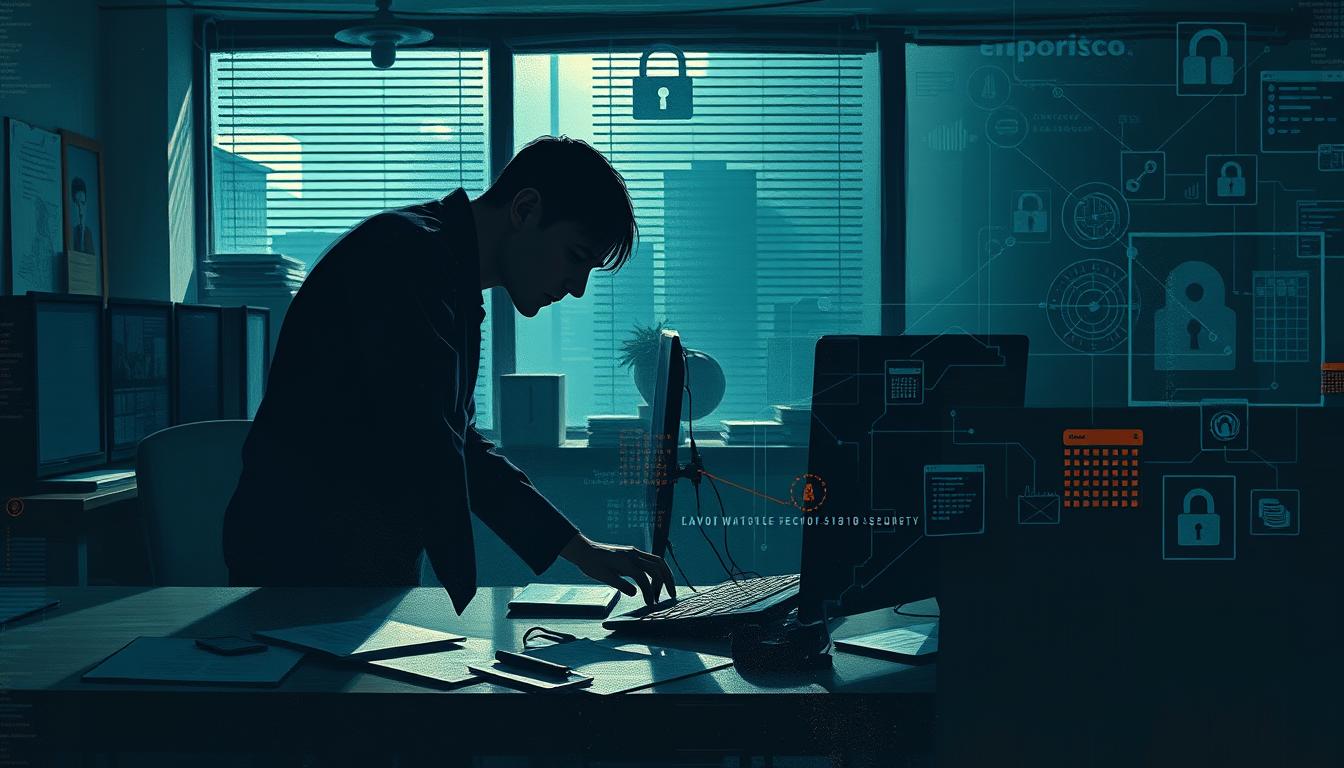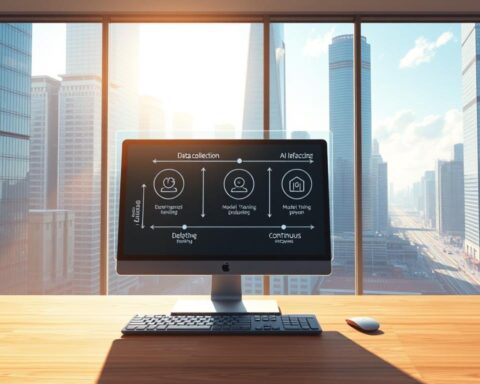Did you know that 81% of data breaches are due to weak or stolen passwords1? This shows how vital cyber hygiene is in today’s world. On Day 12 of our Cybersecurity Training, we’ll look at daily habits to keep you safe online.
Cyber hygiene is more than just a term; it’s a way to keep your digital life safe. Just like brushing your teeth prevents cavities, good cyber hygiene fights off digital threats. With cybercrimes increasing, strong cybersecurity is more important than ever2.
Poor digital security can have severe effects. Up to 60% of small businesses that face a data breach close within six months2. But, good cyber hygiene can cut the cost of cyber attacks by half1. This shows why strong cybersecurity habits are key for everyone.
Key Takeaways
- Weak passwords contribute to 81% of data breaches
- Good cyber hygiene can halve the financial impact of cyber incidents
- Daily cybersecurity practices are essential in the post-pandemic digital landscape
- Small businesses are highly vulnerable to cyber attacks
- Proactive cyber hygiene habits can greatly reduce security risks
Understanding Cyber Hygiene Fundamentals
Cyber hygiene is key to keeping your digital life safe and private. It’s like washing your hands to stay healthy. It keeps your online world clean and secure.
What is Cyber Hygiene?
Cyber hygiene means taking steps to keep your online space safe. It includes keeping software up to date, using strong passwords, and protecting your data. These steps are important because cybercrime can happen to anyone, no matter their online presence3.
Why Cyber Hygiene Matters
In today’s digital world, good cyber hygiene is essential. It helps prevent data breaches and unauthorized access. For example, using two-factor authentication can stop almost all account attacks4.
Regular cyber hygiene practices can stop security breaches and protect your personal info5.
The Impact of Poor Digital Security Practices
Ignoring cyber hygiene can lead to big problems. About 60% of small businesses shut down after a cyber attack45. It can take over 200 days to notice a data breach, showing why we need to act early4.
Also, 70% of companies face security breaches because of poor cyber hygiene5.
“Cyber hygiene is not just a practice; it’s a mindset that safeguards our digital lives.”
By learning and following these basics, we can make the internet safer for everyone. Good cyber hygiene is a continuous effort that needs constant attention and awareness.
Essential Tools for Digital Security
In today’s digital world, the right tools for online safety are key. Let’s look at the main parts of a strong defense against cyber threats.
Antivirus and Malware Protection Software
Antivirus software is your first defense. It checks files, finds bad software, and removes it. With more cyberattacks, this tool is essential for everyone6.
Good antivirus software can greatly lower your risk of data breaches. In 2022, 82% of data breaches involved a human mistake. This shows how important strong protection is7.
Network Firewalls and Their Importance
Network firewalls block threats from outside. They watch traffic, stopping suspicious actions. A good firewall can stop about 70% of unauthorized access8.
Businesses with Extended Detection and Response (XDR) solved breaches 29 days faster than without it. This shows how effective advanced security is7.
Password Management Tools
Password management is key for social media safety and digital security. These tools help make and keep strong passwords, protecting against unauthorized access.
Strong passwords should be 12-16 characters long. They should mix letters, numbers, and special characters. Using a password manager can cut account breach risk by up to 80%68.
Good cyber hygiene, including these tools, can greatly boost your online safety. It helps protect against phishing and other cyber threats.
Cyber Hygiene: Daily Habits for Staying Secure Online
Cyber hygiene is key in today’s digital world. With 95% of cyber breaches caused by human mistakes, it’s vital to have good daily habits9. These habits help prevent malware and keep you safe online.
First, make strong passwords. Use at least 12 characters, including letters, numbers, and symbols10. Don’t use the same password for all accounts, as 75% of people do, which raises the risk of hacking1.
Turn on two-factor authentication (2FA) for important accounts. This can stop up to 99.9% of automated attacks9. Also, use biometric verification when you can for more security.
Keep your software and systems updated. Companies that do this cut their cyberattack risk by 80%9. Update apps, browsers, and operating systems to get security patches10.
Back up your data often, following the 3-2-1 rule: three copies, two local, and one off-site9. This is important, as 70% of ransomware attacks could be prevented with good backups1.
| Cyber Hygiene Habit | Impact |
|---|---|
| Strong, unique passwords | Prevents 80% of data breaches1 |
| Two-factor authentication | Blocks 99.9% of automated attacks9 |
| Regular software updates | Reduces cyberattack risk by 80%9 |
| Data backups | Prevents 70% of ransomware impacts1 |
Be careful of phishing emails. 90% of malware comes from these emails, so being aware is key1. Learn to spot scams to keep your cybersecurity strong.
By making these habits part of your daily life, you’ll greatly improve your online safety. Remember, cyber hygiene is a continuous effort that needs constant attention and awareness.
Authentication and Access Control Best Practices
Strong authentication and access control are key to digital privacy and online safety. By using good cybersecurity practices, you can lower the risk of unauthorized access. This keeps your accounts and sensitive info safe.
Creating Strong Passwords
Weak passwords are a big security risk. Sadly, “password” and “123456” are often used11. To boost your online safety, make passwords at least 16 characters long. Use letters, numbers, and symbols11. Don’t use personal info like names or birthdays in your passwords.
Multi-Factor Authentication Implementation
Multi-factor authentication (MFA) adds extra security beyond just a username and password. Many places now ask for MFA as an extra safety step11. Using MFA can greatly lower the risk of unauthorized access to your accounts12. Start by turning on MFA for your email. Then, do the same for financial services, social networks, and other key accounts11.
Biometric Security Measures
Biometric security, like fingerprint and facial recognition, is a handy and secure way to log in. It’s getting more common in smartphones and other devices. It adds an extra layer of protection for your digital privacy.
| Authentication Method | Strength | Convenience |
|---|---|---|
| Simple Password | Low | High |
| Complex Password | Medium | Medium |
| Multi-Factor Authentication | High | Medium |
| Biometric Security | Very High | High |
By following these best practices for authentication and access control, you can greatly improve your cybersecurity. This helps protect your digital assets from unauthorized access.
Data Protection and Backup Strategies
In the world of cybersecurity, keeping your digital stuff safe is key. You need strong data protection and backup plans to stay secure online. Here are some top tips to keep your data safe.
The 3-2-1 Backup Rule is a great way to protect your data. It means having 3 copies of your data, on 2 different types of media, and 1 off-site backup. This keeps your data safe from ransomware13.
Keeping your software up to date is also important. It helps protect your devices and data from malware13. This simple step is a big part of staying safe online.
Using a password manager can make your accounts much safer. These tools help you create and remember strong passwords. Try to use passwords that are at least 18 characters long, with letters, numbers, and symbols13.
| Backup Strategy | Description | Benefits |
|---|---|---|
| Cloud Storage | Store data on remote servers | Easy access, automatic syncing |
| External Hard Drives | Physical storage devices | Offline access, large capacity |
| Network Attached Storage (NAS) | Dedicated file storage system | Centralized storage, remote access |
Cyber attacks like the Air Europa breach show how important data protection is. They highlight the need for strong security measures14. Businesses should train employees on password security, system updates, and backups14.
Good data protection not only keeps your online world safe but also builds trust with your customers. It’s key for your business to grow and stay strong14. By following these tips, you can greatly improve your online security and protect your digital treasures.
Secure Network Management
Keeping your network safe is key to online safety. Let’s look at important network security steps to boost your cybersecurity practices.
Wi-Fi Security Protocols
Strong Wi-Fi security is essential for protecting your internet. Use complex passwords and turn on WPA2 encryption to block unauthorized access. Remember, 81% of data breaches are due to weak or stolen passwords, showing how important strong Wi-Fi is15.
VPN Usage Guidelines
Virtual Private Networks (VPNs) are key for internet security. They encrypt your online actions, making it tough for hackers to get your data. Always use a VPN when using public Wi-Fi for important tasks16.
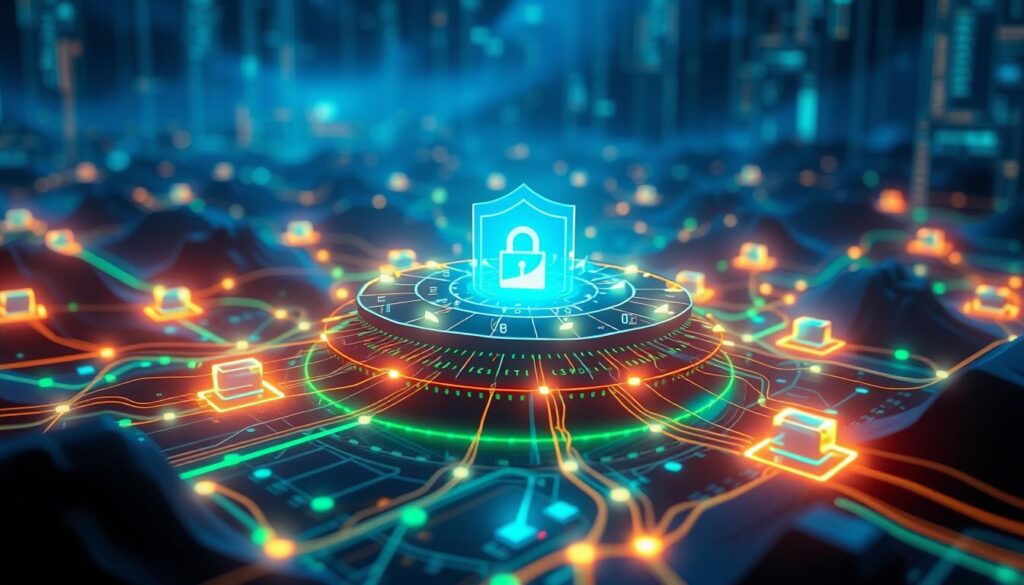
Network Monitoring Practices
Regular network checks help find and stop security issues. Businesses with Extended Detection and Response (XDR) can handle a breach 29 days faster than those without16. Keep monitoring to catch odd activity fast and act quickly.
By following these tips, you’ll greatly improve your network security. Over 90% of cyber breaches happen because of human mistakes, showing the need for good cyber habits15. Stay alert and keep your network safe to protect your digital world.
Software and System Maintenance
Keeping your digital defenses strong is key. This often overlooked part of cyber hygiene is vital for staying safe online. It helps prevent malware and keeps your systems secure.
Regular Update Schedules
Software updates are your first defense against cyber threats. Devices with old software are 90% more likely to get hacked17. Make sure your operating system and apps update automatically. This keeps you safe with the latest security fixes.
Patch Management
Good patch management is key for online security and system function. Cybercriminals use known vulnerabilities in 60% of attacks18. Create a plan for updates that focuses on the most important ones. This keeps all systems up to date.
System Cleanup Procedures
Regular cleanups boost your system’s speed and security. Get rid of unused programs, clear temporary files, and organize your data. This makes your device faster and less vulnerable to malware.
| Maintenance Task | Frequency | Security Impact |
|---|---|---|
| Software Updates | Weekly | High |
| Patch Management | As Released | Critical |
| System Cleanup | Monthly | Medium |
By following these maintenance steps, you lower your risk of cyber attacks. Remember, 95% of breaches are due to human error17. Stay alert and make these habits part of your daily routine. This will keep your digital world safe.
Social Engineering Defense
Social engineering attacks are a big threat to our online safety and privacy. They use tricks on people, not just technology. This makes them very dangerous. In fact, 98% of cyber-attacks use social engineering19.
Phishing is the biggest danger to our personal and business data20. In 2023, almost 60% of suspicious emails were trying to steal login details19. This shows we need better ways to fight phishing and to be more aware.
Small businesses are hit hard by these attacks. Employees in small companies face attacks 350% more often than those in big ones19. This shows why all businesses need strong cybersecurity.
The cost of these attacks is huge. In 2023, the average data breach cost was $4.3 million19. Companies using AI and automation saved about $1.8 million compared to those without19.
Effective Defense Strategies
- Implement strong password policies and use password managers
- Enable multi-factor authentication
- Regularly update software and systems
- Conduct employee training on recognizing social engineering attempts
- Use anti-malware solutions and firewalls
By following these steps, we can protect ourselves and our organizations better. Remember, being alert and informed is essential to keep our digital privacy safe from social engineering threats.
Conclusion
Cyber hygiene is key in today’s digital world. It helps organizations stay safe from data breaches21. The cost of a breach can be huge, with an average of $4.45 million in 202322.
Small businesses hit by cyberattacks often fail within six months22. To stay safe, use strong passwords and multi-factor authentication. These steps can greatly reduce risks22.
Staying alert to phishing attempts is also important. About 90% of cyber incidents are caused by human mistakes21. Regular training helps a lot.
Cybersecurity is a continuous effort. The 3-2-1 rule for backups and using Cloud Access Security Brokers are essential21. Following the principle of least privilege is also important.
As threats grow, so must our defenses. By making cybersecurity a daily habit, we can make the internet safer for all.
FAQ
What is cyber hygiene?
Why is cyber hygiene important?
What are some essential tools for digital security?
How often should I update my software?
What is multi-factor authentication (MFA)?
How can I create a strong password?
What is a VPN and when should I use it?
How often should I back up my data?
What is social engineering in cybersecurity?
How can I protect myself from phishing attacks?
Source Links
- Good Cyber Hygiene Habits to help Stay Safe Online – GeeksforGeeks – https://www.geeksforgeeks.org/good-cyber-hygiene-habits/
- Cyber Hygiene Definition & Checklist – https://usa.kaspersky.com/resource-center/preemptive-safety/cyber-hygiene-habits?srsltid=AfmBOopUNx0dZTrnhWDir-ndiLPD_v-O-hDg_d5x3_GQ-us8KUp6n1I_
- Your Guide To Better Cyber Hygiene – DigitalVA – https://digital.va.gov/cyber-spot/your-guide-to-better-cyber-hygiene/
- October Is Cybersecurity Awareness Month: Cyber Hygiene 101 – https://www.suncanyon.bank/blog/post/october-is-cybersecurity-awareness-month-cyber-hygiene-101-
- Cyber Hygiene Definition & Checklist – https://usa.kaspersky.com/resource-center/preemptive-safety/cyber-hygiene-habits?srsltid=AfmBOopImCB7SXny5fDEfXtcADxkGH2VP2bB8lee6kOG9K23kyrwGvm5
- Cyber Hygiene: Daily Habits to Improve Your Personal Cybersecurity – https://www.linkedin.com/pulse/cyber-hygiene-daily-habits-improve-your-personal-malaviarachchi-vykac
- What Is Cyber Hygiene? Top 10 Ways to Stay Safe Online – https://www.aura.com/learn/cyber-hygiene
- Cyber Hygiene Definition & Checklist – https://usa.kaspersky.com/resource-center/preemptive-safety/cyber-hygiene-habits?srsltid=AfmBOopSYK4xibVGdVH6sdl9WdeiFLJSCiT95LDezAnW7LuxcevCofMV
- Cyber Hygiene: Essential Tips to Stay Safe Online – Twintel – https://www.twintel.net/security/cyber-hygiene-essential-tips-to-stay-safe-online/
- Good cyber hygiene habits to help stay safe online – https://us.norton.com/blog/how-to/good-cyber-hygiene
- 4 Things You Can Do To Keep Yourself Cyber Safe | CISA – https://www.cisa.gov/news-events/news/4-things-you-can-do-keep-yourself-cyber-safe
- Cyber Hygiene: 10 Everyday Practices for Enhanced Digital Security – https://www.infosecurityeurope.com/en-gb/blog/guides-checklists/10-everyday-practices-to-enhance-digital-security.html
- Cyber Hygiene – https://itconnect.uw.edu/it-connect-home/ncsam/cyber-hygiene/
- Why Cyber Hygiene Matters: 5 Daily Habits to Protect Your Business – https://v2systems.com/blog/why-cyber-hygiene-matters/
- Stay Safe Online: 5 Essential Tips for World Wide Web Day – https://cpl.thalesgroup.com/blog/data-security/stay-safe-online-5-essential-tips
- What is Cyber Hygiene? 10 Tips to Protect Your Online Life. – https://sennovate.com/cyber-hygiene-101-10-essential-tips-for-protecting-your-personal-online-life/
- Cyber Hygiene Definition & Checklist – https://usa.kaspersky.com/resource-center/preemptive-safety/cyber-hygiene-habits?srsltid=AfmBOopRu8gNTP6H0_yaBnLduY9293URJK27D0mhEJai7cCkizbgRPgE
- Cyber Hygiene 101: Daily Practices to Keep Your Online Presence Clean and Secure – Techplayon – http://www.techplayon.com/cyber-hygiene-101-daily-practices-to-keep-your-online-presence-clean-and-secure/
- How Can You Protect Yourself from Social Engineering? – https://www.proserveit.com/blog/protect-yourself-from-social-engineering
- Drop These Bad Cybersecurity Habits ASAP – Bytagig – https://www.bytagig.com/drop-these-bad-cybersecurity-habits-asap/
- What is Cyber Hygiene and Why is It Important? – https://www.techtarget.com/searchsecurity/definition/cyber-hygiene
- Cyber Hygiene: Best Practices for Individual Online Safety – GlassWire Blog – https://www.glasswire.com/blog/2024/03/28/cyber-hygiene/
